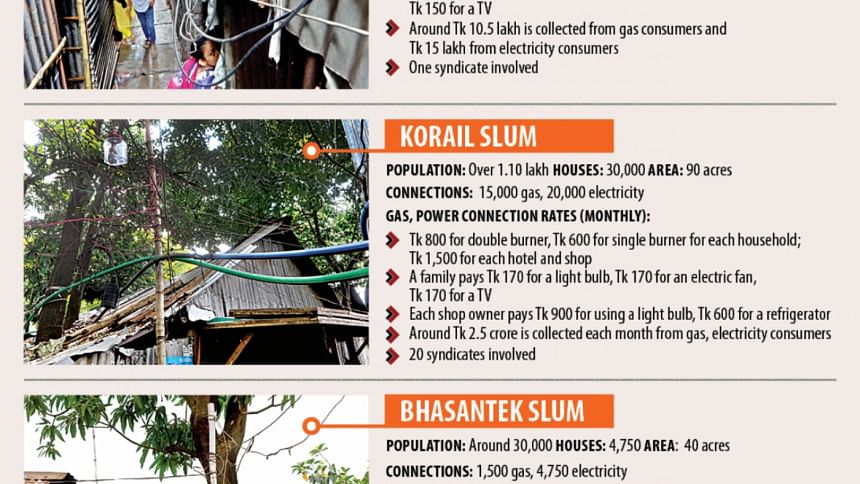Illegal Gas, Power Connections: Syndicates make huge money from 3 slums

Illegal gas and power lines pose serious dangers to around 1.55 lakh people living in three slums of the capital -- Korail Bosti in Mohakhali, Bhasantek Bosti and Chalantika Bosti in Mirpur.
At least 24 syndicates operate in the slums and supply gas and electricity to slum dwellers with the help of some unscrupulous staffers of the city’s utility service providers.
They earn an estimated Tk 2.88 crore per month in exchange of this “service”, and a big chunk of the money is allegedly spent to “manage” police as well as those employees in Titas and Desco.
Installed by the syndicates, numerous supply lines are spread across the slums like spider webs and a small fire can cause a massive disaster.
“Several deadly fires took place in the slums, thanks to defective supply lines of gas and power,” said Shakil Newaz Bhuiyan, immediate-past director (operations) of Fire Service and Civil Defence.
He recalled two incidents at Korail -- one in December 2016 when some 526 houses were burnt to ashes and another in January 2017 that gutted around 4,996 houses.
In both cases, firefighters failed to douse the blaze because of gas explosions, fire service sources said.
In the latest incident, a massive fire broke out at Chalantika slum on August 16, burning down more than a thousand shanties. It left at least five people injured.
Flames from burners, short-circuits, burning mosquito coils and cigarette butts and arson attacks are found to be behind most of the slum fires, officials say, adding that such a blaze intensifies within moments because of illegal gas lines.
“Fire spread across the Chalantika Bosti quickly as gas leaked from the plastic pipes connected to slum houses,” Abdul Halim, assistant director, Fire Service and Civil Defence, told The Daily Star.
“In no time, the fire went out of control. The illegal gas connections are responsible for that.”
Halim, who sits on a three-member body to probe the Chalantika fire, said it would not have become so deadly had plastic pipes for gas supply been not crisscrossed the slum.
Referring to different fire incidents at various slums in Dhaka, he said there were gas explosions in those cases and firefighters could not tame the infernos even after pumping a huge amount of water.
On February 27, two minor children died during a deadly fire at Bhasantek Bosti. Both the children drowned in a ditch inside the slum when people were fleeing from the flames.
Kazi Nazmuzzaman, deputy assistant director of Fire Service and Civil Defence, at that time told The Daily Star that the blaze spread within seconds because of the illegal gas connections.
It took 21 fire engines about three hours to control the flames that ravaged some 600 shanties and left about 3,000 people homeless.
SITTING ON ‘GAS BOMB’
Home to around 1.1 lakh people in 30,000 houses, Korail Bosti is spread over 90 acres of government land in Mohakhali. The 40-acre Bhasantek Bosti houses around 30,000 people in 4,750 homes.
Chalantika Bosti is on 20 acres of khas land where about 15,000 people lived in 3,000 houses before the August 16 blaze.
Because of low rent, hawkers, shopkeepers, roadside vendors, rickshaw and van pullers, CNG drivers, domestic helps and workers from garment, construction and transport sectors live in the slum houses, mostly made of tin, wood and bamboo.
On average, they pay Tk 500 for electricity and Tk 700 for gas per month.
The syndicates connect stainless steel pipes to the main lines of Titas Gas Transmission and Distribution Company, and distribute gas to the slum houses with GI pipes and even plastic or hose pipes.
“To tell the truth, the way the illegal gas lines are installed,” said Mofizur Rahman, councillor of Dhaka North City Corporation’s ward-19, where the slum is located.
“Some corrupt staff of Titas Gas are involved in providing the illegal connections in Korail Bosti in exchange for money,” said Mofizur, also president of ward-19 AL.
In recent visits, these correspondents saw slum dwellers using gas burners inside their tiny rooms, sized around 10 feet by 8 feet, where at least four to five people live. Many of those rooms don’t have any windows.
Besides, burners were found in the doorways.
Some pipes were precariously hanging overhead while some were also seen haphazardly lying on the ground in places.
“I know the way I am using gas is seriously dangerous. But I have no option. It will cost Tk 130 per day if I use kerosene,” Rahim Uddin, a tea-stall vendor at the Chalantika slum, who uses a stove that gets gas through a rubber pipe, said.
In Korail, at least 20 syndicates, allegedly led by local Awami League men Junaid, Nayeb Ali, Sohag, among others, are involved in providing 15,000 illegal gas and 20,000 power connections to slum dwellers. This newspaper couldn’t reach any of the three to get their comment.
In Bhasantek, at least three syndicates are involved in providing around 1,500 gas and 4,750 electricity lines to slum houses, sources involved in the illicit trade told this newspaper.
Insiders say Md Monir, Jahangir and another man run the syndicates. However, none of them could be reached for comments.
In Chalantika, DNCC ward councillor and local AL leader Rojjob Hossain and Jubo League leader Mohammad Dulal reportedly run the syndicates.
There are 1,500 gas and 3,000 power connections in Chalantika Bosti, several slum dwellers said.
Contacted, Rojjob denied his involvement in providing illegal gas and power supplies to the slum. Dulal is on the run since the August 16 fire, said locals.
The slums are also crisscrossed by substandard electric wires supported by bamboo and wooden poles and having multiple joints in places. A number of such poles remain tilted dangerously.
From the main utility poles, electricity is transmitted to slum houses through those illegal wires. Any leak can lead to accidents, especially in the rainy season.
However, a few houses of the three slums were given electricity connections legally through setting up electric meters on poles, several slum people said.
“These electric wires may snap anytime and fall on a slum house, which can cause a disaster,” said Abidur, a rickshaw puller living in Chalantika slum.
Nurul Haque, a former deputy director at the fire service, who headed a number of committees to probe fire incidents, said slum fires mostly originate from electric short-circuits because the wires are of very low quality and installed in an undisciplined way.
Besides, gas burners kept running for long to dry clothes also lead to fire, he said, adding that in some cases, slums are set on fire deliberately.
Kamruzzaman Khan, director (operation), Titas Gas said they don’t provide any gas connections to slums.
Another senior official of Titas said under the existing law, they cannot supply gas to the slum people as the land where they are living on is khas land and the slum houses have no holding numbers.
Wishing anonymity, he also said the government should provide gas cylinders to slum people at lower prices.
On Tuesday, the Titas Gas authorities launched a drive to disconnect illegal gas connections in part of the Chalantika slum, locals told this newspaper.
Sources from Bhasantek Bosti said the authorities also conducted a drive at the slum on Sunday to sever illegal gas lines.
Several slum dwellers said they saw such drives in the past but the situation usually goes back to square one within a few days.
Contacted, Noor Mohammad, executive director (operation) of Dhaka Electric Supply Company (Desco), claimed there is no illegal connection of electricity in any slum in the capital.
When told that these correspondents saw illegal power lines at Korail, Bhasantek and Chalantika slum, he said Desco formed a monitoring committee after the recent fire at Chalantika and found no illegal connection at the slum.
He said Desco supplied electricity to different slums, where roads are in good shape, by setting up meters on poles.
He, however, admitted that the way electric wires are connected to different slum houses is risky.
Talking to The Daily Star, Masudur Rahman, deputy commissioner (media) of Dhaka Metropolitan Police said, “We have no specific information that a section of police members cooperated with vested quarters in providing illegal gas and power supply in slums in exchange of money.
“Police will take action if any police members are found involved in such illegal activities.”


 For all latest news, follow The Daily Star's Google News channel.
For all latest news, follow The Daily Star's Google News channel. 






Comments